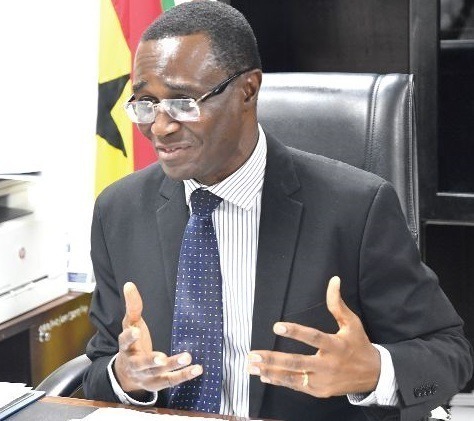The Ghana Revenue Authority (GRA) has given indication that it will support companies in difficulties to revive their operations to be able to meet their tax obligations to the state and create employment for Ghanaians.
The commissioner-general of the GRA, Dr Ammishaddai Owusu-Amoah, said the Authority was not only interested in companies’ compliance to their tax obligations but also in ensuring that those in distress were assisted to contribute to accelerated economic growth and job creation.
“We are more interested in seeing companies grow to meet their tax obligations. So that mentality or sad notion that the GRA is only interested in getting the money and not so interested in whether the company will survive or not is not true,” he said.
Dr Owusu-Amoah was briefing the media after a tour of the revamped United Steel Company Limited, which was purchased by leading steel manufacturer B5 Plus Limited after it failed to meet its tax obligations and was put under administration and eventual sale.
He said the GRA was willing to engage and find out the situations at the company level and ways to help revive operations, adding that the GRA would just not go around and collapse companies.
“So we are committed to making sure that we get the taxes at the same time to make sure that Ghanaians also get the jobs and get production and our GDP going up,” he said.
At the time of the sale, United Steel had an outstanding tax liability with interest and penalties as well as debts owed to banks and creditors amounting to over GH¢400 million.
Dr Owusu-Amoah said B5 Plus Limited after it bought the company paid the tax liability of GH¢149 million in full after taking advantage of the waiver of penalties and interest and also paid the monies due to the over 400 workers as well as re-engaged many of them.
“And then the factory has also, as you saw today, been completely put back on its feet to be able to produce and we’ll be getting over GH¢100 million annually in terms of taxes,” he added.
“When the factory was in operation, I visited and looked around to see what we can do about it even though we’re still shutting them down trying to get the liability. And since we sold the factory we also have come to see whether the one that we sold it to is committed to the task.”
On whether the GRA would adopt the same strategy for companies owing taxes, the Commissioner-General said the GRA would use all compliance measures that were available in the law and ready to implement them to the letter.
However, he said any action taken would not be to collapse the company but to explore whatever could be done to revive the company.
“I think that you have gone around the factory, you have seen that it’s a very big factory, need to be able to go to the extent of selling the factory and making sure that we have got our taxes, the principal taxes were paid in full, then it means that no matter how small or how big you are you ready to ensure that we will collect the taxes in full. But at the same time, we also consent that the production should continue. People should not be laid off and therefore when we’re selling we have to put all this into the negotiations,” he said.
He said the GRA was on course in meeting its target for 2023 through various initiatives and enforcement actions.
He lauded B5 Plus Limited for the huge investment and impressive work in transforming the factory to the current stage.
The chief executive officer of B5 Plus Limited, Mukesh Thakwani, lauded Ghana’s investment climate and the ample opportunities that needed to be exploited.
He said the buying of United Steel was a bit of a high value because B5 Plus had to re-equip the whole factory as everything from the roofing to machinery needed to be changed and “we have been working on that for the past six months.”
It has been quite challenging for us. What we expected and what we found on the ground was quite different but a lot of credit to the entire team being positive and optimistic and we are really looking forward to generating a good product,” Mukesh Thakwani said.
“I think that is one of the reasons that though we are working 24 hours, it has still taken six months and it will take another one and a half months for us to start this plant. Our target is that before December, we should at least be able to take some trials so that from next year, we are able to run this plant successfully and make everyone proud.”
He said the company had so far invested more than US$35 million to revamp the factory and in the next two years with the increasing production line, it would invest another US$10 million.
He said currently there were 420 workers and this could rise to more than 500 when other product lines come on stream.
“We are not only targeting Ghanaians and the West Africa sub-regional market but the whole African region to take advantage of AfCFTA,” he added.
He pledged to pay between GH¢100 million and GH¢150 million in taxes once in operation and called for support, especially a ban on products that could competitively be produced at the company.








































